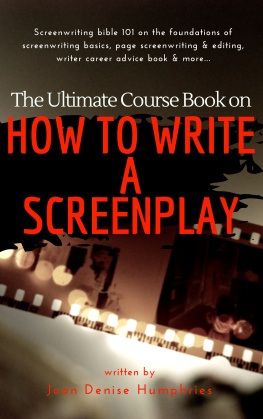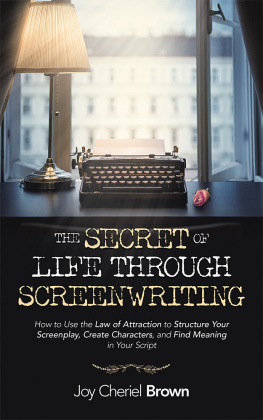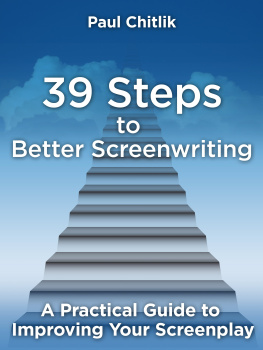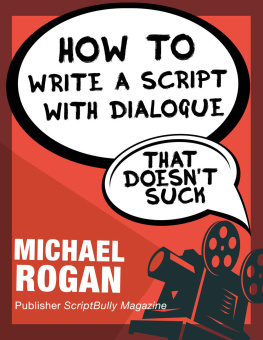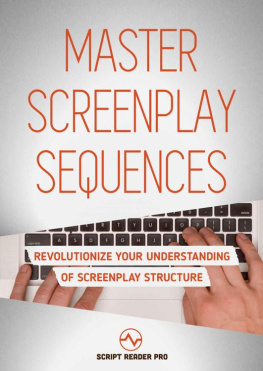Christopher Teaford - Screenwriting 101: Screenwriting For Dummies
Here you can read online Christopher Teaford - Screenwriting 101: Screenwriting For Dummies full text of the book (entire story) in english for free. Download pdf and epub, get meaning, cover and reviews about this ebook. genre: Romance novel. Description of the work, (preface) as well as reviews are available. Best literature library LitArk.com created for fans of good reading and offers a wide selection of genres:
Romance novel
Science fiction
Adventure
Detective
Science
History
Home and family
Prose
Art
Politics
Computer
Non-fiction
Religion
Business
Children
Humor
Choose a favorite category and find really read worthwhile books. Enjoy immersion in the world of imagination, feel the emotions of the characters or learn something new for yourself, make an fascinating discovery.
- Book:Screenwriting 101: Screenwriting For Dummies
- Author:
- Genre:
- Rating:4 / 5
- Favourites:Add to favourites
- Your mark:
- 80
- 1
- 2
- 3
- 4
- 5
Screenwriting 101: Screenwriting For Dummies: summary, description and annotation
We offer to read an annotation, description, summary or preface (depends on what the author of the book "Screenwriting 101: Screenwriting For Dummies" wrote himself). If you haven't found the necessary information about the book — write in the comments, we will try to find it.
Screenwriting 101: Screenwriting For Dummies — read online for free the complete book (whole text) full work
Below is the text of the book, divided by pages. System saving the place of the last page read, allows you to conveniently read the book "Screenwriting 101: Screenwriting For Dummies" online for free, without having to search again every time where you left off. Put a bookmark, and you can go to the page where you finished reading at any time.
Font size:
Interval:
Bookmark:
SCREENWRITING 101: SCREENWRITING FOR DUMMIES
The work contained herein has been produced with the intent to provide relevant knowledge and information on the topic on the topic described in the title for entertainment purposes only. While the author has gone to every extent to furnish up to date and true information, no claims can be made as to its accuracy or validity as the author has made no claims to be an expert on this topic. Notwithstanding, the reader is asked to do their own research and consult any subject matter experts they deem necessary to ensure the quality and accuracy of the material presented herein.
This statement is legally binding as deemed by the Committee of Publishers Association and the American Bar Association for the territory of the United States. Other jurisdictions may apply their own legal statutes. Any reproduction, transmission, or copying of this material contained in this work without the express written consent of the copyright holder shall be deemed as a copyright violation as per the current legislation in force on the date of publishing and subsequent time thereafter. All additional works derived from this material may be claimed by the holder of this copyright.
The data, depictions, events, descriptions, and all other information forthwith are considered to be true, fair, and accurate unless the work is expressly described as a work of fiction. Regardless of the nature of this work, the Publisher is exempt from any responsibility of actions taken by the reader in conjunction with this work. The Publisher acknowledges that the reader acts of their own accord and releases the author and Publisher of any responsibility for the observance of tips, advice, counsel, strategies and techniques that may be offered in this volume.
All knowledge contained in this book is given for informational and educational purposes only. The author is not in any way accountable for any results or outcomes that emanate from using this material. Constructive attempts have been made to provide information that is both accurate and effective, but the author is not bound for the accuracy or use/misuse of this information.
TABLE OF CONTENTS
Without saying, almost every religious lover of movies or writer has, at some point, considered becoming a screenwriter. And this may be due to various reasons, including the power of the small or big screen, the awards, fame, success, or the money popular screenwriters make off their screenplays. Regardless of your driving force, screenwriting is a beautiful career choice.
While everybody reading this book may not be full beginners some of you might have started a career in the industry already I am guessing most of you are still hoping for your big break. While screenwriting is a technical aspect of creative writing, it is pertinent to ask yourself if you actually have what it takes to be a screenwriter.
Of course, writing screenplays can be rewarding; however, it isn't an easy task. It demands a serious investment of dedication, time, and discipline to develop an excellent and sellable screenplay.
Just like any other profession, screenwriting requires that a writer is able to express him or herself in the simplest possible manner. The best way to do that is through dialogue. A good screenplay never rests on just words on a page, it uses and reuses them to tell its story. In essence, a screenplay is a work of art.
As with any form of art, the best art forms come from inspiration and the unconscious mind. Most screenwriters begin their stories with an idea for how to tell the story. From there, they draw from a variety of inspirations to get closer to expressing what they have in mind. Often these ideas are fueled by personal experience or may even be derived from a book, movie, or videogame that changed the writer's life.
Screenwriting also requires a lot of research. This is why it's considered one of the most difficult professions to penetrate. A writer has to gather information and figure out how to present it to the audience. While this is a difficult task, it is one that requires the same type of skill and creativity that goes into writing any other type of paper.
Writing a screenplay requires the knowledge of how movies are made. Film after film has used a different structure and characters to tell a story. This all begins with having a plan in mind and writers must keep this in mind throughout the process, as it will be difficult to change the plan once it's set. Many writers may become frustrated because they lose focus along the way.
Another important part of screenwriting means the ability to think of a concept of character motivation. An example of this is the use of sub-plots. This is small story, or stories, that is told between the main story. A compelling sub-plot would be giving a character something they want, but not allowing them to have it. This can be tricky for an inexperienced screenwriter, but it's an essential part of telling any good story.
One of the most important aspects of the process is finding the right genre. If a writer doesn't choose a proper genre, then he or she won't have a chance of being successful. A writer should choose a genre based on their own interest, not necessarily based on what the majority of people will consider to be interesting. Once the writer finds a genre that interests them, they'll be able to write a quality screenplay.
The last part of screenwriting means developing a script. This is the most important part of screenwriting, as it determines the quality of the story that will be told. A screenwriter needs to make sure that the story they've written is captivating, innovative, and thought-provoking. They also need to ensure that the characters are interesting and well-defined. Once the story is captivating, the writer should be able to sustain it throughout the course of the entire screenplay.
There are many other aspects of screenwriting, but these four are critical. For writers who want to become successful, they need to learn all about the various methods of screenwriting. As long as they stay true to their own creative ideas, they'll eventually find success with it. If they don't maintain focus, though, it may be difficult to get past their initial obstacles.
When they learn all about screenwriting, the writers can start developing their own unique style. It's important to have a method that works for them, so they can continue to write consistently. This is one of the key things that differentiates between a good screenwriter and a bad one. If you find a method that works for you, then you'll be able to use your writing skills to make your screenplay even better.
Knowing all about screenwriting allows a writer to focus on writing a quality script. Sometimes they have trouble developing a plot because not all of the information that is available to them. However, if they find a way to condense the information that is initially given to them, they'll be able to develop an engaging storyline. When writers realize how important it is to condense information, they'll try harder to write quality screenplays. In the end, they'll find that there are some amazing screenwriting software tools that can help them write faster, and better scripts.
As you can see, knowing about screenwriting is very important if you want to write better screenplays. Whether you're just beginning to write or you've been at it for a while, you need to know this information. The more you know, the better off you'll be. There are many screenwriting websites that will show you everything you need to know. If you get stuck, they can also give you hints and tips that will help you along the way.
This book will take you hand-in-glove into the rubrics of writing the "perfect" screenplay of your dream! Undoubtedly, screenwriting comprises different steps, cut across various aspects technically, it is a comparative study (although there are a few general rules), depending on your guide. With "Screenwriting 101: Screenwriting for Dummies," you can be sure of becoming a screenwriter who is worthy of competing in the industry!
Font size:
Interval:
Bookmark:
Similar books «Screenwriting 101: Screenwriting For Dummies»
Look at similar books to Screenwriting 101: Screenwriting For Dummies. We have selected literature similar in name and meaning in the hope of providing readers with more options to find new, interesting, not yet read works.
Discussion, reviews of the book Screenwriting 101: Screenwriting For Dummies and just readers' own opinions. Leave your comments, write what you think about the work, its meaning or the main characters. Specify what exactly you liked and what you didn't like, and why you think so.



